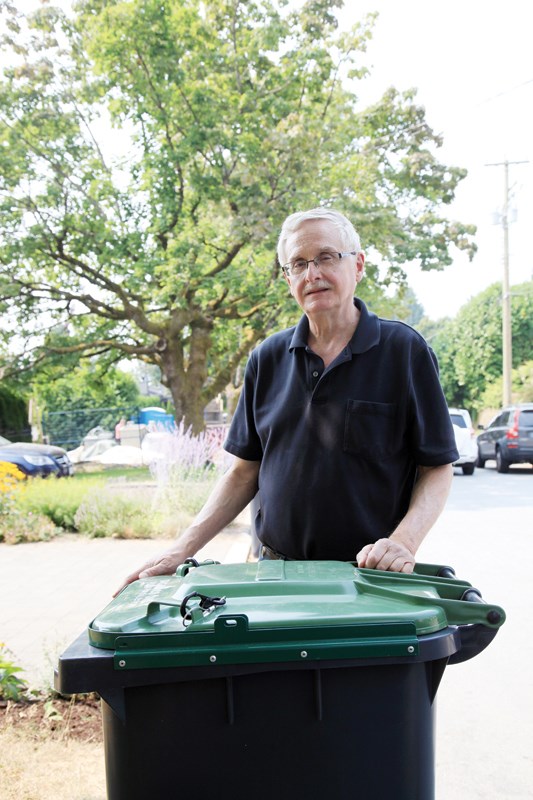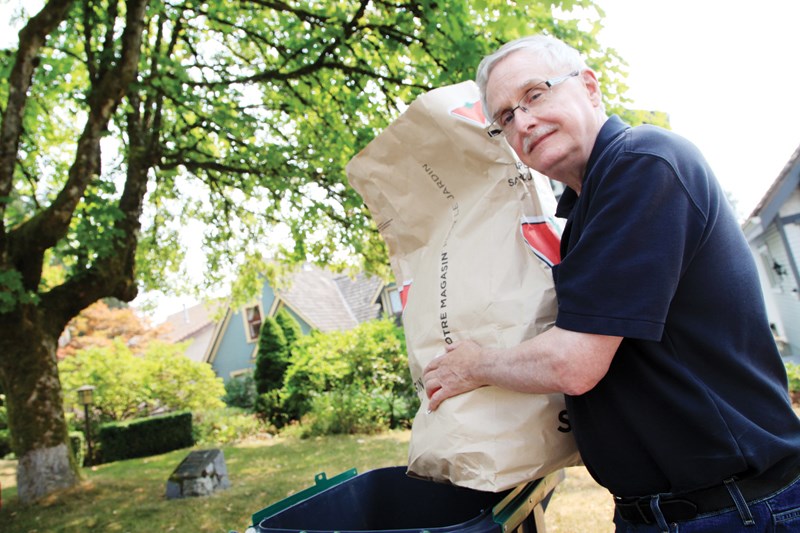One man’s disaster is another man’s glitch.
Divisions have deepened surrounding the District of North Vancouver’s new garbage collection system, with Coun. Roger Bassam assessing the new approach “a failure.”
The system stipulates that yard trimmings and kitchen scraps must be in the district’s new carts rather than the old bins or the paper sacks favoured by some residents.
“We’ve actually had more calls and contacts on this issue than on any other issue since I’ve been in office,” Bassam said. “The vitriol that is being expressed from some of the constituents, the frustration, it can’t be ignored.”
The district has received 4,000 calls about garbage pickup. However, 75 per cent of the calls have been “inquiries rather than complaints,” according to a district staff report.
Bassam’s views are something of an outlier, noted Mayor Richard Walton.
While there is a certain amount of controversy, residents can still put out “as much as they did before,” he said.
The old system allowed residents to put out six bags of yard waste beside their bins, likely bringing the total volume to about 460 litres, according to district chief administrative officer David Stuart.
However, if a resident requests a second cart, which the municipality provides free of charge, residents can drop about 480 litres of green waste on the curb under the new system.
The $65 annual charge for a second cart was eliminated following outcry from the community.
While there have been “hiccups,” the new system has resulted in 10 per cent less garbage and 10 per cent more green waste, according to Stuart, who explained that the numbers are “very preliminary.”
As “implementation glitches” are being addressed, complaints “are mostly going away,” he added.
The new system may work on paper but it’s not working in practise, according to Upper Lonsdale resident David Schreck.

Two bins are the equivalent of four garden bags, according to Schreck.
“When I prune my hedge I have over 20 garden bags,” he said.
The new system leaves residents driving green waste to recycling stations, negating environmental benefits and costing taxpayers more money, according to Schreck.
“This new system is really a way to pay more taxes for less service,” he said.
Bassam said fixing garbage pickup will be his top priority when council meetings resume in September, even if it comes with a cost.
“The amount of money that we spend doing municipal solid waste is not a significant amount of money compared to the impact on the community,” he said. “I think people just expect that they pay a significant amount of taxes and they should be getting the kind of service that they need.”
There’s not a compelling reason to return to the old system, according to Stuart.
“If we have – and can provide – all the capacity that people need, why would we go back?” he asked. “I don’t know what there is to go back to or why we would do that.”
Picking up old garbage carts led to a “service fiasco,” according to Bassam, who referred to one resident whose old cart sat on his driveway for 22 days before being picked up.
Schreck said he’s still waiting for district staff to pick up his old bins.
“Lord knows, every day I check the website and they don’t put any notices up,” he said.
Forcing homeowners to use new bins is poor environmental policy, according to district resident Margot Masterton.
“They are replacing perfectly adequate plastic with new plastic,” she wrote in a letter to the North Shore News.
After spending 25 years on the curb, the carts needed to be replaced with bins that were more resistant to browsing bears, according to Walton.
While a determined, “400-pound, smart” bear can get into just about anything, the new carts are built to be more resistant, according to Walton.
District staff have been playing “catch-up” after being inundated with more requests than anticipated, but have picked up 5,000 old containers so far, according to a staff report.
The switch to the new system is part of a Metro Vancouver initiative to recycle 80 per cent of waste by 2020.
The initiative is also meant to save taxpayer dollars as garbage loads consisting of more than 25 per cent food scraps are subject to a higher tipping fees, resulting in higher waste disposal bills.



